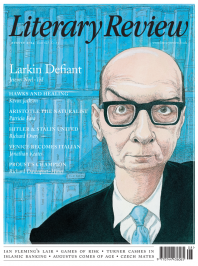Peter Jones
And Then There Was One
Augustus: From Revolutionary to Emperor
By Adrian Goldsworthy
Weidenfeld & Nicolson 598pp £25
The idea that Roman emperors spent their time engaged in or recovering from orgies is highly misleading. In 29 BC, a merchant ship anchored off a fishing village on the small, obscure Greek island of Gyaros and a local fisherman boarded. He was an ambassador for the community. His mission was to importune the emperor to reduce its tribute from 150 to 100 drachmas, a sum worth less than a cow. We do not know if he was successful but, as Adrian Goldsworthy makes clear, of such minutiae was the life of an emperor made up. As Seneca, an adviser to Nero, said, ‘So many thousands of people have to be given audience, so many petitions must be dealt with; such a crush of matters coming together from the whole world has to be sorted out, so that it can be submitted in due order to the mind of the most eminent emperor.’
Augustus, the first Roman emperor (though arguably Julius Caesar was an emperor in all but name), who became undisputed ruler in 31 BC and reigned until his death in AD 14, ushered in this new world of one-man rule. Over the previous hundred years, the authority of the traditional Roman

Sign Up to our newsletter
Receive free articles, highlights from the archive, news, details of prizes, and much more.@Lit_Review
Follow Literary Review on Twitter
Twitter Feed
Though Jean-Michel Basquiat was a sensation in his lifetime, it was thirty years after his death that one of his pieces fetched a record price of $110.5 million.
Stephen Smith explores the artist's starry afterlife.
Stephen Smith - Paint Fast, Die Young
Stephen Smith: Paint Fast, Die Young - Jean-Michel Basquiat: The Making of an Icon by Doug Woodham
literaryreview.co.uk
15th-century news transmission was a slow business, reliant on horses and ships. As the centuries passed, though, mass newspapers and faster transport sped things up.
John Adamson examines how this evolution changed Europe.
John Adamson - Hold the Front Page
John Adamson: Hold the Front Page - The Great Exchange: Making the News in Early Modern Europe by Joad Raymond Wren
literaryreview.co.uk
"Every page of "Killing the Dead" bursts with fresh insights and deliciously gory details. And, like all the best vampires, it’ll come back to haunt you long after you think you’re done."
✍️My review of John Blair's new book for @Lit_Review
Alexander Lee - Dead Men Walking
Alexander Lee: Dead Men Walking - Killing the Dead: Vampire Epidemics from Mesopotamia to the New World by John Blair
literaryreview.co.uk